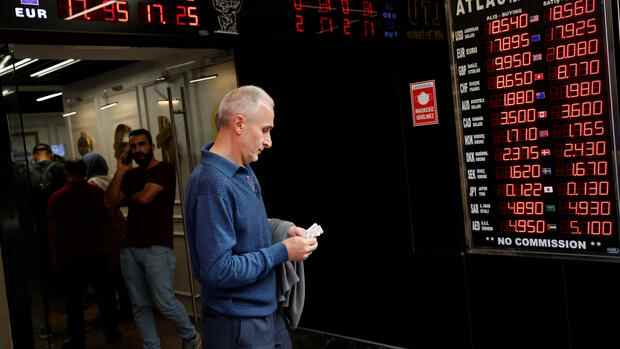The price of imported goods is rising continuously due to the weak lira.
(Photo: Reuters)
Istanbul The historical weakness of the euro puts Turkish exporters in a difficult situation – and with it the German economy in the country.
In global markets, the dollar’s year-to-date gains against almost all world currencies have continued to be strong. The euro has lost around a quarter against the greenback since the beginning of the year and is currently as weak as it was decades ago. In addition, the Turkish lira is so weak that the loss is even greater.
According to trade associations, 72 percent of Turkey’s imports are in US currency, while 48 percent of exports are in euros. “The development of the dollar hits our balance sheet twice,” reports the board of a company to the Handelsblatt.
“Exporters have long been saying that their profits are shrinking,” says Hakan Güldag, editor-in-chief of the Turkish business daily Dünya. According to the journalist, the damage already amounts to ten billion US dollars.
Top jobs of the day
Find the best jobs now and
be notified by email.
And that puts President Recep Tayyip Erdogan’s economic model under considerable pressure. Turkey’s long-term president wants to trim his economy for expansion and exports.
Erdogan declares himself the “enemy of high interest rates”
Low key interest rates should also help. The reference interest rate is 12 percent, even though inflation has risen to over 80 percent. Normally, interest rate hikes help lower inflation by dampening demand for credit and goods. However, Erdogan does not think about it: “I am an enemy of high interest rates,” he recently declared.
>> Read also: Erdogan wants interest rates to be in the single digits by the end of the year
An economic experiment that may work in times of global stability. However, the Russian war of aggression in Ukraine has upset global markets.
Global inflation is rising along with the prices of energy commodities such as oil and gas. The US Federal Reserve is counteracting this by raising interest rates. That makes the dollar attractive to investors, but the opposite is true for emerging markets like Turkey.
And so the dollar is getting stronger and currencies like the Turkish lira are getting weaker. For a country that still depends on imports, this means great difficulties.
The Turkish President is increasingly coming under pressure from the economy, which is struggling with the weak national currency.
(Photo: via REUTERS)
Turkey’s trade deficit widened last month by 300 percent from the same period last year. Companies are having to spend more and more on their dollar imports, while exports, at least to the euro area, are not bringing in enough due to the relative weakness of the euro against the dollar.
The deteriorating mood is also noticeable on the stock exchange. The leading Turkish index ISE 100 has risen by more than 75 percent since the beginning of the year. Even converted into euros, this results in an increase of around 50 percent. But with the strong dollar, prices have been under pressure for a month. Stocks like Is Bankasi, a private financial services firm, fell a third.
Sentiment is also depressed by pressure from the EU and the US on Turkish companies that might circumvent sanctions against Russia. For example, five Turkish banks participated in the Russian payment system Mir. As a result, Russian tourists in Turkey, for example, were able to pay their bills without cash despite the blocking of the Visa and Mastercard systems for Russian banks.
German companies have to convert proceeds into lira
Among the five financial institutions are three state banks and Is Bankasi, almost a third of which belongs to the opposition party CHP. After the two private banks stopped working with Mir last week, according to information from the Bloomberg news agency, the three state banks now want to do the same.
The country’s economy calls on Erdogan to act. In addition to Turkish export companies, a number of German companies also have production sites in the country. For example, Bosch employs thousands of people in Turkey and produces car parts there for the whole world. Dax giants such as Bayer, Siemens and BASF are also represented on the Bosporus.
But recently the government caused great concern among foreign companies. By decree, all companies in Turkey must convert part of their export earnings into the local currency. Given the weakness of the lira, this is a risky undertaking that could mess up the parent company’s balance sheet at any time.
If the dollar continues to gain in value against the lira and the euro, the problems are only likely to increase – and with it the pressure on President Erdogan to take countermeasures.
More: 70 percent in the plus – but the Turkish stock market miracle harbors many risks
